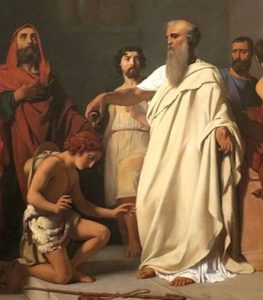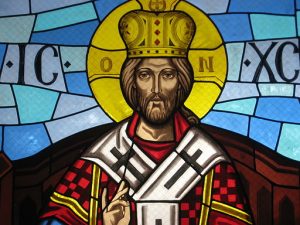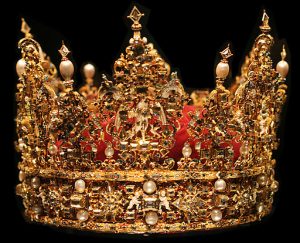 A fundamental aspect of God’s plan to redeem the world is mend is the idea that sin caused a break in the relationship between humankind and God, so God’s plan is to mend that break so that we can dwell together forever.
A fundamental aspect of God’s plan to redeem the world is mend is the idea that sin caused a break in the relationship between humankind and God, so God’s plan is to mend that break so that we can dwell together forever.
When God first makes man and woman, he puts them in a garden, and he walks and talks with them there. When they sin, they are cast out of the garden, and therefore barred from entering his presence. Mankind rapidly increases in wickedness until the whole world is filled with corruption.
However, God makes a covenant with the people of Israel that they will be his people, and he will be their God. After the covenant is first enacted, and before it was broken in any way, seventy elders of Israel could enter God’s presence and not suffer harm (Ex. 24:9-14).
This shows that God had, through this covenant, already begun to mend the severed relationship between mankind and himself, so that people could enter his presence once again, even if only temporarily. The break in intimacy was beginning to be healed, but it still was only partial: only a few could enter God’s presence, from one nation that he had chosen to extend his covenant.
When the Israelites left the presence of God on Mt. Sinai, he gave them instructions on how to make a portable facility where they could meet with God once again, the tabernacle. God said to Moses,
Then have them make a sanctuary for me, and I will dwell among them. (Ex. 25:8)
Notice what is significant in this sentence: God tells them to make a sanctuary for him, but his goal is not to dwell in it, but to dwell among them. His goal is to have intimacy with his people, for them to live in his presence. After it is built and consecrated, God’s Holy Spirit indwells it, and his people can worship him in the desert wherever they go.
When the Israelites sin by worshiping the golden calf, God threatens that his presence would not go with them into the Promised Land. He relents, however, after Moses pleads for them, and says they do not want to go if his presence does not go with them (Ex. 33). Later, Moses reminds them that they are unique among the nations in having their God so near them (Deut. 4:7). This was a central aspect of the blessing of Israel, that they could come near the true God.
Looking ahead to the New Testament, we see fulfillment of the messianic imagery of God’s presence coming near his people in a powerful new way. Certainly, when Jesus walked on earth as Emmanuel, God with us, God’s presence was at its peak in the person of Jesus. Yet he said there was coming something better: God’s presence as the Holy Spirit being poured out on humanity.
While before the people worshiped God in the temple where his presence dwelt, now God’s presence dwelt in the people, making God’s people the temple. The blood of the first covenant made it so that the seventy elders could enter God’s presence, but the blood of the new covenant by the atonement of Christ made it so that God’s presence could be poured out into the whole world.
Sing for joy and be glad, O daughter of Zion; for behold I am coming and I will dwell in your midst,” declares the LORD. “Many nations will join themselves to the LORD in that day and will become My people. Then I will dwell in your midst, and you will know that the LORD of hosts has sent Me to you. (Zech 2:10-12)
Here, God had accomplished an even greater thing than in his first covenant, in terms of healing the breach between himself and humanity. While the first covenant allowed a few to enter his presence, this new covenant allowed people of all nations to repent and enter his presence. His presence would flow out into the world through them!
The final picture of God’s presence fully among his people is that of heaven in Revelation.
Then I saw a new heaven and a new earth; for the first heaven and the first earth passed away, and there is no longer any sea. And I saw the holy city, new Jerusalem, coming down out of heaven from God, made ready as a bride adorned for her husband. And I heard a loud voice from the throne, saying, “Behold, the tabernacle of God is among men, and He will dwell among them, and they shall be His people, and God Himself will be among them, and He will wipe away every tear from their eyes; and there will no longer be any death; there will no longer be any mourning, or crying, or pain; the first things have passed away.” (Rev. 21:1-4)
It is impossible to imagine the glory of God we will experience when we are present with him in heaven, but if there is any doubt that this is not the ultimate goal from the very beginning of scripture, we only need to compare the vision of heaven at end of the book of Revelation with the garden of Eden in the beginning of Genesis.
 In Revelation, we read a description of heaven that includes a tree of life, a river of life, no sin, no death, and many other things that remind us of the the garden of Eden in Genesis. In Hebrew, the word for “heaven” is actually gan eden, the Garden of Eden! It is a picture of what all of the Bible is about, that the Lord made humans to dwell with him in intimate relationship.
In Revelation, we read a description of heaven that includes a tree of life, a river of life, no sin, no death, and many other things that remind us of the the garden of Eden in Genesis. In Hebrew, the word for “heaven” is actually gan eden, the Garden of Eden! It is a picture of what all of the Bible is about, that the Lord made humans to dwell with him in intimate relationship.
When that relationship was severed by sin, God immediately made a plan to redeem humanity. Over history he worked out that plan so that the end is even more glorious than the beginning. At first only two people live in the presence of God, but at the end an entire kingdom of people live with God for all eternity!
~~~~
Photos: Jade Seok on Unsplash, Inge Wallumrød from Pexels







